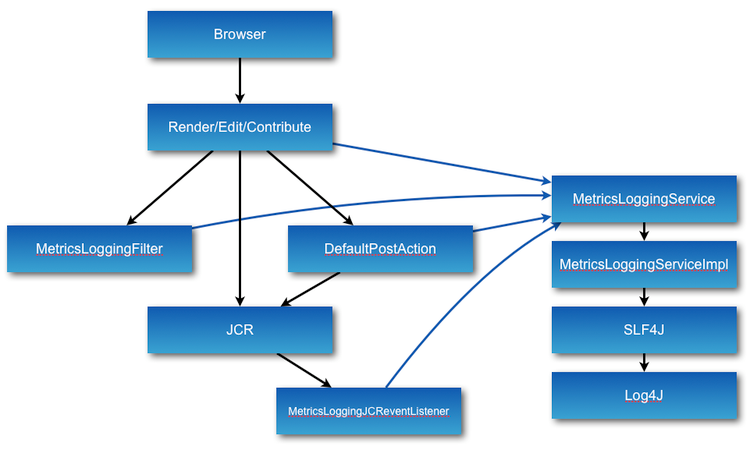Configuring event and system logging
Jahia includes a logging service that you can use to generate traces of system events at a very high speed. This topic describes the architecture of the logging service, what you can log (events and system performance), and how to modify configuration files to change what gets logged.
Architecture
The figure below illustrates the architecture of the logging service. The main interface is the MetricsLoggingService API which includes methods to perform logging. The default implementation is the MetricsLoggingServiceImpl class.
The black arrows represent the actual path for content processing and rendering, while the blue arrows represent the calls to the logging service to trace the events being performed in the system.
As you can see, the default implementation uses the SLF4J Java library to perform the logging, but this could be modified by provided another implementation if the need be. SLF4J by default is configured to use the Log4J logging library that has been integrated in Jahia since its inception.
Below the JCR API, we have a listener class that will trace events as they are being performed directly on the JCR nodes, in order to trace modifications performed on the content tree either through the regular user interface or through custom JCR clients.
Default configuration
By default, Jahia uses the logging service to log the following information:
- Content events
This could be module viewing, content being created, updated or removed. The log will be created in files named : jahia_access.log* - Profiling information
This log contains profile information for the rendering times of different modules, very useful to track overall system performance. This logging has a minimal overhead (less than 5%). The log will be created in files named : jahia_profiler.log*
Examples
You can find example on how to post-process log files to extract usage data in the mod-default module. It features two examples - one contains a list of the top ten visited pages, based on site navigation by users, and the other is a recommendation system similar to what major online retailers feature that analyzes user sessions to build recommendations on content such as "users that have viewed this content has also viewed...". Please refer to that module's documentation for more details.
Event templates
Jahia's logging service uses the SLF4J library to perform it's logging, and therefore can use its formatting anchors to customize the logging messages. Jahia regroups similar message formats into what is called "event templates", that may be configurable, although we provided default formats out of the box (for more information see the configuration section below).
Here is a list of the used event templates inside Jahia's logging system :
- pageViewed : indicates the processing of an HTTP GET request. This can be a request for a full content page or a simple node, but is not generated for child objects.
- nodeCreated : indicates a JCR node has been created.
- nodeUpdated : indicates a JCR node has been modified.
- nodeDeleted : indicates a JCR node has been deleted.
- moduleViewed : indicates that a module (or node) has been viewed. Contrary to the "pageViewed" event, this is generated for each node that is part of a global HTTP GET request.
Configuration
This section presents the configuration files involved in setting up the logging service and its various components. Note that in general it is recommended to make as few changes as possible, as it will make migration to more recent versions of Jahia easier, since there will be less customization to merge.
WEB-INF/etc/spring/logging/applicationcontext-logging.xml
This Spring configuration provides both the implementation of the Jahia logging API as well as the event templates setup. Unless you have a strong need for another implementation, we recommend you use the default service implementation, but you might have a need to customize the event templates, in order for example to ease post-processing of the logs.
<bean id="loggingService" class="org.jahia.services.logging.MetricsLoggingServiceImpl" factory-method="getInstance">
<property name="logTemplatesMap">
<map>
<entry key="moduleViewed" value="module viewed with template {}"/>
<entry key="pageViewed" value="page viewed with {} from {}"/>
<entry key="nodeUpdated" value="node updated with {}"/>
<entry key="nodeCreated" value="node created with {}"/>
<entry key="nodeDeleted" value="node deleted"/>
</map>
</property>
</bean>
WEB-INF/etc/config/log4j.xml
The default configuration provides a Log4J XML configuration that provides two categories that are used by the logging service : loggingService and profilerLoggingService. The first is used to trace content event operations, while the second is used to log all profiling information.
Here below we present an extract of the log4j.xml file with the relevant sections. Note that the appenders, that are responsible for setting up the logging to the destination are presented first, and then the required categories simply have references to the declared appenders.
<appender name="profilerLogs" class="org.apache.log4j.DailyRollingFileAppender">
<param name="File" value="jahia_profiler.log"/>
<param name="Threshold" value="debug"/>
<layout class="org.apache.log4j.PatternLayout">
<param name="ConversionPattern" value="%d %m%n"/>
</layout>
<filter class="org.apache.log4j.varia.LevelMatchFilter">
<param name="LevelToMatch" value="debug"/>
<param name="AcceptOnMatch" value="true"/>
</filter>
<filter class="org.apache.log4j.varia.DenyAllFilter"/>
</appender>
<appender name="hitAccess" class="org.apache.log4j.DailyRollingFileAppender">
<param name="File" value="jahia_access.log"/>
<param name="Threshold" value="trace"/>
<layout class="org.apache.log4j.PatternLayout">
<param name="ConversionPattern" value="%d %m%n"/>
</layout>
<filter class="org.apache.log4j.varia.LevelMatchFilter">
<param name="LevelToMatch" value="trace"/>
<param name="AcceptOnMatch" value="true"/>
</filter>
<filter class="org.apache.log4j.varia.DenyAllFilter"/>
</appender>
...
<category name="loggingService" additivity="false">
<priority value="trace"/>
<appender-ref ref="hitAccess"/>
</category>
<category name="profilerLoggingService" additivity="false">
<priority value="debug"/>
<appender-ref ref="profilerLogs"/>
</category>
WEB-INF/etc/spring/jcr/applicationcontext-jcr.xml
This configuration file contains the settings to configure logging for the JCR tree operations. Here is an extract of the default configuration.
<bean id="JCRStoreService" class="org.jahia.services.content.JCRStoreService" parent="jahiaServiceTemplate" factory-method="getInstance" lazy-init="true">
...
<property name="listeners">
<map>
<entry key="default">
<list>
...
<bean class="org.jahia.services.logging.MetricsLoggingJCReventListener">
<property name="loggingService" ref="loggingService"/>
<property name="nodeTypesList">
<list/>
</property>
</bean>
...
</list>
</entry>
</map>
</property>
...
</bean>
As you can see in the above configuration, the logging JCR event listener is configured only for the "default" workspace, which is the editing workspace. Also note that the event listener can take a nodeTypesList parameter that can contain a List<String> of JCR node types to listen to. If none are specified, all the node types will be logged.
